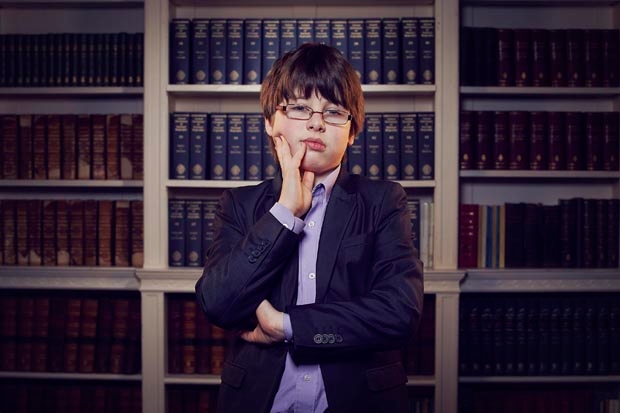On Tuesday night on Channel 4, a stern male figure peered over his glasses (as equipped with one of those cords favoured by themiddle-aged specs-wearer) and offered us his robust views on how government benefits encourage laziness. Which might not sound that unusual — except that the male figure in question was 12.
His name, no less improbably, was Mog and he was a contestant in the new series of Child Genius, now hosted by Richard Osman — these days almost as ubiquitous on television as Susan Calman is onRadio 4. As ever, the first few minutes were spent assuring us how fiendish the quiz would be; but, as ever too, this was no mere hype. One of Mog’s early questions was what comes next in the sequence 1, 3, 5, 15, 17, and although the avuncular Osman disappointingly failed to explain why Mog’s instant answer of ‘51’ was correct, a spot of Googling has revealed that the sequence is formed by alternately multiplying by three and adding two.
But what makes the programme such an addictive pleasure (if perhaps a mildly guilty one) is that we get the contestants’ back stories — which is how we heard Mog’s political views and saw for ourselves his appealingly unashamed enjoyment of his own cleverness. We also found out that he’s learning several languages, among them Mandarin and Korean, and that he likes to relax by doing a little art, with Picasso an acknowledged influence. ‘Mog is a very unique person,’ his waitress mother told us in what sounded like a rather long-suffering tone.
But, as far as the programme is concerned, Mog was unusual in another way as well — because he’d chosen to take part in the competition himself, with his parents happy to look on in baffled awe. More typical was 11-year-old Christopher, whose dad Simon had not only insisted that he enter, but also made him study every previous episode of Child Genius as part of his revision.
In his defence, Simon’s motives for making his young son appear on TV being asked very difficult questions in front of a studio audience were impeccable: ‘Because I never got a chance to.’ Less convinced, meanwhile, was his Vietnamese beautician wife, who at one point tried to take Christopher’s mind off the ordeal ahead by massaging his feet: a plan that might have worked better had Simon not kept bursting in and bellowing such questions as ‘26 squared?’
Oddly, come the big day, even hearing his dad loudly proclaim that ‘I’m expecting Christopher to absolutely nail it’ didn’t settle the boy’s nerves, and he caved in a bit under the pressure. Nonetheless, his ability to name the currencies of Mozambique and Papua New Guinea meant that he made it through to next week’s episode — leaving the narrator to note, with careful emphasis on the first word, that ‘Simon is a step closer to having his ambitions fulfilled.’
The Investigator: a British Crime Story (Thursday) is clearly intended as ITV’s answer to such true-crime documentary series as Making a Murderer — and, for both good and ill, that’s pretty much what it turns out to be. Not surprisingly for a programme co-produced by Simon Cowell’s company, it doesn’t stint on what’s known in the trade as ‘the grammar of television’: the melodramatic reconstructions; the constant badgering of us to marvel at what we’re hearing; the pretence that it’s ‘discovering’ things it obviously knew about in advance. But it’s also picked a genuinely intriguing case — and while the presenter Mark Williams-Thomas (the policeman-turned-journalist whose most famous coup was exposing Jimmy Savile) can’t be called a TV natural, his slightly plodding decency acts as a useful counterbalance to the excesses elsewhere.
His investigation in this four-part series is on behalf of Samantha Gillingham who, in June 1985 when she was 16, returned home with her dad Russell to find a note from her mother that read, ‘I’ve had enough and I’m leaving.’ When nothing more was heard from her, Russell did report the disappearance, but after a woman claiming to be the missing Carole Packman turned up at a police station to pronounce herself safe, the search for her was called off. Yet, nine years later, for reasons the first episode left unexplained, Russell was arrested for her murder and is now serving life. The body, however, has never been found, and he continues to protest his innocence. Understandably, Sam is desperate to find out the full story — but her father hasn’t answered any of her letters.
So far, Williams-Thomas has definitely been better at raising interesting questions than at answering them. We have learned, though, that Russell was a violent man who’d moved his much younger mistress into the family house, and later the marital bed.
You could argue, in fact, that the investigation is proceeding a little too slowly — but maybe that’s just another way of saying how successfully the programme, ultimately a triumph of content over style, makes us want to know what on earth happened to Carole.






Comments